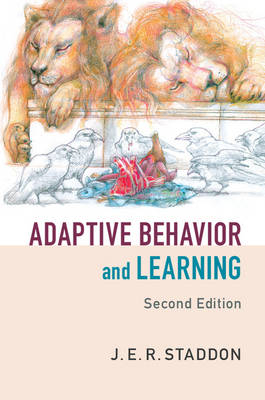
Adaptive Behavior and Learning
Cambridge University Press (Verlag)
978-1-107-08247-2 (ISBN)
Every day at about 4:30, Jazz, a Hungarian Vizsla dog, leaps up on the sofa and looks out for his owner who always comes home at 5:00. He doesn't need an internal clock because he has an acute sense of smell that allows him to measure how long his master has been absent. Explaining complex behavior in simple ways, this book is a fascinating exploration of the evolution, development and processes of learning in animals. Now in its second edition, there is increased emphasis on development, evolution and dynamics; new accounts of taxic orientation, reflex induction, habituation and operant learning in organisms; more discussion of spatial learning and the processes underlying it; expanded chapters on choice and completely new chapters on molar laws, classical conditioning theories and comparative cognition. J. E. R. Staddon provides a definitive summary of contemporary theoretical understanding suitable for graduates and advanced undergraduates.
J. E. R. Staddon is James B. Duke Professor of Psychology and Professor of Biology and Neurobiology Emeritus at Duke University. He has written and lectured on public policy issues such as education, evolution, traffic control and the effects of sociobiological aspects of the financial system, and is the author of over 200 research papers and five books, including The New Behaviorism (2014), Unlucky Strike (2013), The Malign Hand of the Markets (2012) and Adaptive Dynamics: The Theoretical Analysis of Behavior (2001).
1. The evolution, development, and modification of behavior; 2. Variation and selection: kineses; 3. Reflexes; 4. Direct orientation and feedback; 5. Operant behavior; 6. Reward and punishment; 7. Feeding regulation: a model motivational system; 8. The optimal allocation of behavior; 9. Choice: dynamics and decision rules; 10. Foraging and behavioral ecology; 11. Stimulus control and cognition; 12. Stimulus control and performance; 13. Molar laws; 14. Time and memory, I; 15. Time and memory, II; 16. Template learning; 17. Learning, I; 18. Models of classical conditioning; 19. Learning, II; 20. Learning, III: procedures; 21. Comparative cognition.
| Erscheint lt. Verlag | 10.3.2016 |
|---|---|
| Zusatzinfo | 5 Tables, black and white; 10 Halftones, black and white; 198 Line drawings, black and white |
| Verlagsort | Cambridge |
| Sprache | englisch |
| Maße | 180 x 253 mm |
| Gewicht | 1350 g |
| Themenwelt | Geisteswissenschaften ► Psychologie ► Allgemeine Psychologie |
| Geisteswissenschaften ► Psychologie ► Biopsychologie / Neurowissenschaften | |
| Geisteswissenschaften ► Psychologie ► Verhaltenstherapie | |
| Naturwissenschaften ► Biologie ► Humanbiologie | |
| Naturwissenschaften ► Biologie ► Zoologie | |
| ISBN-10 | 1-107-08247-1 / 1107082471 |
| ISBN-13 | 978-1-107-08247-2 / 9781107082472 |
| Zustand | Neuware |
| Informationen gemäß Produktsicherheitsverordnung (GPSR) | |
| Haben Sie eine Frage zum Produkt? |
aus dem Bereich


